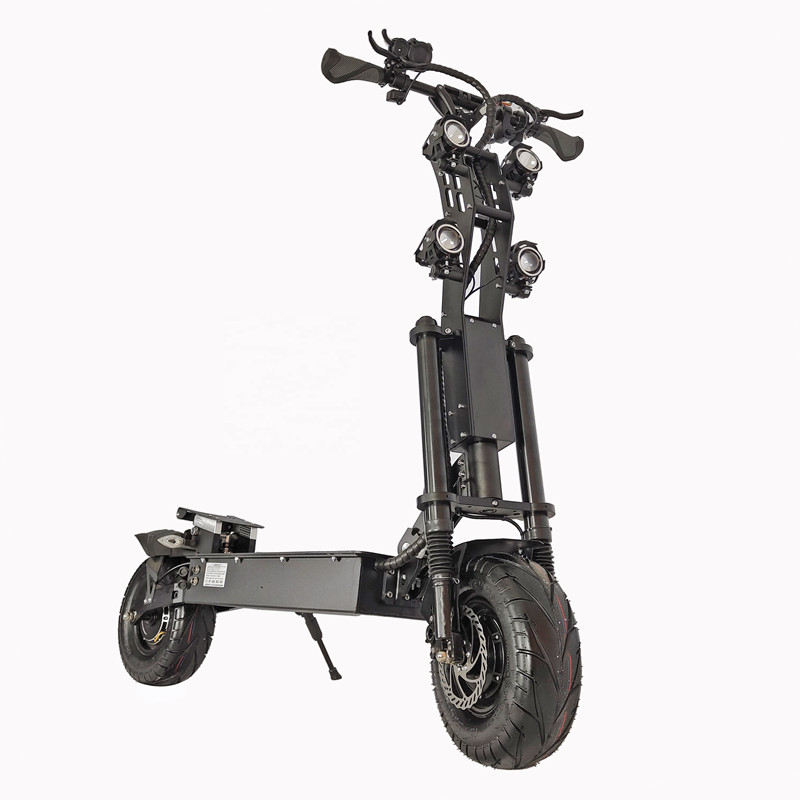Description
scooters 3 weels
triciclo adulto electrico
dual motor electric scooter 5600w
| Parameter | |
| Frame | High strength aluminum alloy 6061, surface paint |
| Forking forks | One forming front fork and rear fork |
| Electric machinery | 13 “72V 15000W brushless toothed high speed motor |
| Controller | 72V 100 SAH*2 tube vector sinusoidal brushless controller (mini type) |
| Battery | 84V 70 AH-85 AH module lithium battery (Tian energy 21700) |
| Meter | LCD speed, temperature, power display and fault display |
| GPS | Location and telecontrol alarm |
| Braking system | After one disc, does not contain harmful substance, in compliance with international environmental requirements |
| Brake handle | Forging brake of aluminum alloy with power breaking function |
| Tyre | Zheng Xin tire 13 inch |
| Headlight | LED lenticular bright headlights and driving lights |
| Maximum speed | 125 km |
| Extension mileage | 155-160km |
| Motor | 7500 watt per piece |
| Wheel | 13 inch |
| Net weight and gross weight | 64kg/75kg |
| Product size | L* w* h: 1300*560*1030 (mm) |
| Packaging size | L* w* h: 1330*320*780 (mm) |









Bicicleta In English
Title: The Evolution of the Bicycle in English Culture
In the rich tapestry of English culture, the bicycle holds a unique place. It is not just a mode of transportation; it is a symbol of identity, history, and the ongoing relationship between England and the bicycle. This two-wheeled contraption has traversed the annals of English history, evolving and adapting to reflect the cultural and technological shifts that have occurred within the nation.
The bicycle’s origins can be traced back to the early 19th century, when it was first conceived as a hobbyist’s toy. These early bicycles, known as “domino bike” (bone shakers), were primitive affairs, made from bones and wood, and lacking any form of modern safety features or comfort. They were a novelty, a plaything for the rich, and a curiosity that captured the public’s imagination.
As the century progressed, the bicycle began to shed its novelty status and become a practical mode of transportation. The development of the pneumatic tire in the 1880s by John Dunlop revolutionized the bicycle, making it more stable and comfortable, and therefore more accessible to a wider audience. This was followed by the invention of the chain-driven bicycle, which further improved upon the design, making it more efficient and reliable.
In England, the bicycle quickly became a fixture of urban life. It was a way for the working class to get around, providing a level of independence and mobility that was previously unheard of. The bicycle allowed individuals to move freely, unrestricted by the constraints of public transportation or horse-drawn carriages. This newfound freedom was celebrated in popular culture, with novels, songs, and even entire subcultures – such as the cycling clubs of the late 19th century – cropping up around the bike.
As the bicycle gained popularity, so too did its cultural significance. It became a symbol of progress and modernity in England. It was seen as a way to improve public health, reduce congestion in cities, and even act as a form of social leveller. The rise of the Tour de France in the early 20th century showcased the bicycle’s potential for both recreation and sport, drawing people from all walks of life to participate or spectate.
However, as with any cultural phenomenon, the bicycle has faced its challenges and criticisms. Concerns over safety and etiquette often dogged its progress. The early 20th century saw a backlash against cyclists as they were blamed for traffic congestion and pedestrian accidents. But as cycling infrastructure improved and laws were passed to regulate cyclists’ behavior, these concerns were assuaged.
Today, the bicycle in England is more popular than ever. With the rise of eco-consciousness and concerns over public health, cycling has become more than just a mode of transportation; it has become a way of life. Cycling lanes are popping up in cities across the country, and cycling events are drawing thousands of participants. The bicycle has truly become ingrained in English culture, representing progress, freedom, and sustainability.
In conclusion, the bicycle in English culture has gone through many iterations and transformations. It has been a toy, a tool, a symbol of social change, and an agent of environmental awareness. As England continues to evolve, so too will its relationship with this two-wheeled icon.





Reviews
There are no reviews yet.